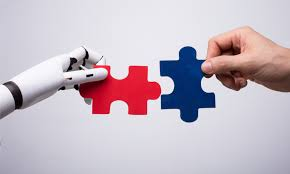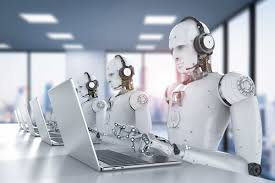
Artificial intelligence (AI) is a computer or machine’s ability to perform tasks commonly associated with intelligent beings or animals. In simpler terms, artificial intelligence is intelligence displayed by a machine, unlike the natural intelligence shown by humans or animals which also involves emotions and consciousness. Artificial intelligence started as an academic study in 1955 and since then has been met by a wave of high optimism but that hasn’t stopped some people from seeing it as a threat to human existence. But there are many more reasons to be excited about AI than there are reasons to be threatened by it.
(AI) is gradually changing the way we go about our everyday routines, and it’s easy to admit that the changes have been quite positive and have improved our lives. Artificial Intelligence has been continuously gaining attention in different sectors, including in business, by its ability to learn different tasks with minimal command or input. Organizations have taken notice of this.
There are two types of Artificial Intelligence, which are;
Narrow AI - This is the AI that we experience all around us in computers today. They are exhibited in systems that have been taught or have learned how to carry out specific tasks without being programmed to perform those tasks. This is artificial intelligence, as seen in the speech and language recognition of Siri on the Apple iPhone and in the vision-recognition systems on self-driving cars.
General AI - This flexible form of intelligence can learn how to carry out generally different tasks. Tasks, including haircutting, building spreadsheets, or reasoning about a wide variety of topics based on their accumulated experience. This is the sort of Artificial Intelligence seen in movies, like The Terminator, but it doesn’t exist yet. Experts are still divided over how soon it can become a reality.
Popular organizations that have successfully adopted artificial intelligence include;
- Apple with Siri
- Tesla
- Cogito
- Netflix
- Pandora
- Amazon with Alexa
- Google with Nest
BENEFITS OF ARTIFICIAL INTELLIGENCE
VISIBLE CHANGES IN THE WORKPLACE

The workplace is one place that has mainly been affected by AI. One way companies have been using AI is to improve the quality and accuracy of production results while performing tasks quicker. With the huge amount of data that AI can use to “learn,” decisions are made more quickly, based on more precise information. AIs are able to collect and quickly process vast amounts of information, helping us make better decisions.
CUSTOMER EXPERIENCE

Customer Experience is one of the most critical things for any business, and Artificial intelligence is expected to significantly improve it. AI can be used to do the initial sorting of customer complaints, questions or inquiries, and applications for services before transferring the customer to the right department to address their needs. But AI is capable of doing much more than that. Sentiment analysis technology is gradually being added to customer support software that would have the intelligence to handle inquiries and complaints more effectively.
AI-enabled customer support software will help give quick and accurate responses to customers and build better engagement with your ideal target market. And because AI can learn large amounts of information and data, it can also provide customer service and upsell opportunities that would definitely benefit the business.
IMPROVED COMMUNICATION

The integration of AI into communication systems and the general improvement of communication technology have led to excellent speech recognition and translation advancements. Access to accurate data and powerful computing capacity is available for your communication needs. Apps with powerful built-in microchips can “hear” and translate words of a different language while in a conversation.
The development of complex and intelligent algorithms allows business to business (B2B) communication of relevant data and information between the entities involved faster. It’s because real-time intelligence and statistics are readily available in complex decision-making. It also allows businesses to have a global presence and also become competitive on a global scale.
CYBERSECURITY

Cybersecurity is a big issue nowadays for big organizations as well as private individuals. AI is an essential factor in both sides of the spectrum regarding cybersecurity. Hackers are usually relentless in their endeavors. They generally attack at every chance they get daily. There are thousands of malicious apps being blocked daily. These attacks are significant in number and might be AI-assisted. Newer attacks have been known to include deep fake technology that is causing a challenge to content marketers and cybersecurity experts.
Similarly, the other side of this spectrum also largely depends on AI-enabled apps, software, and programs. AI-enabled software helps identify vulnerabilities in a network, adequately adjust to fighting attacks, and provide practical solutions to counter with proper defense strategies in systems.
THE NEGATIVE SIDES OF ARTIFICIAL INTELLIGENCE
There is no doubt that Artificial Intelligence would benefit a lot of industries and their processes, but Artificial Intelligence comes with its own disadvantages. Here are some of them:
1. LACK OF CREATIVITY
These machines can’t be creative. They only execute commands that they have been taught. Machines help in designing and creating, they can’t match the immense power of the human brain. Humans are sensitive and are intellectuals, which makes them very creative.
Humans can generate ideas and can think out of the box. Humans see, hear, think and feel, these are things machines can’t possibly do. The thoughts of humans are generally guided by feelings machines lack.
2. HIGH UNEMPLOYMENT RATES
One of the most mentioned disadvantages of Artificial Intelligence is the chance that it might lead to high levels of unemployment and it is understandable why. With Artificial Intelligence, machines will be able to do certain tasks that humans currently do.
This might be the beginning of mass unemployment. In the future, human beings would need to add to their skills in order to reduce the chances of losing their jobs to machines.
CONCLUSION
Artificial Intelligence is getting more prominent and more popular quickly, positively affecting how we live, interact, and improve customer experience. There is a lot more to come from AI in the coming years. Liked this article? Check out our blog.
